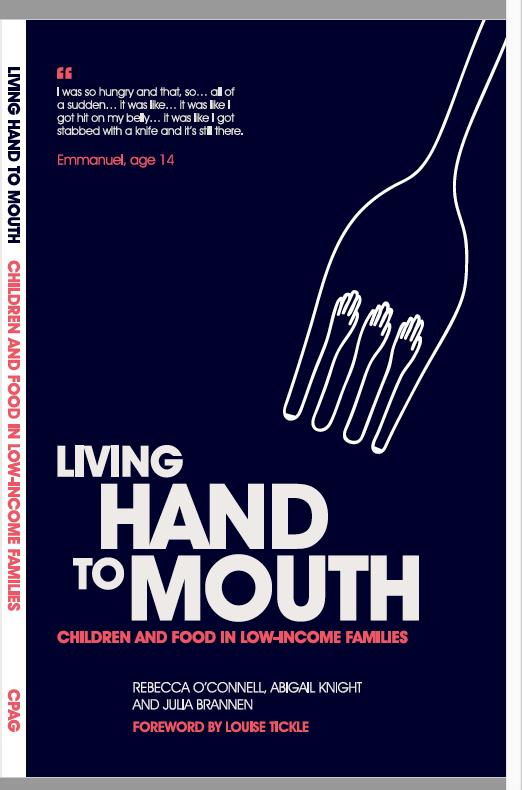Living Hand to Mouth gives a voice to children experiencing food poverty
Posted on 13 Sep 2019 Categories: News, Publications
A new book, Living Hand to Mouth, ‘details the lives of children whose parents can’t afford to put regular meals on the table’. Using the first-hand accounts of 51 children, the book shines a light on children’s lived experience of poverty and ‘how they manage their everyday lives around food’.
Written by Rebecca O’Connell, Abigail Knight and Julia Brannen from the Thomas Coram Research Unit, UCL Institute of Education, the book reports on the UK findings of the Families and Food in Hard Times study. Over four million children are growing up in poverty, ‘with many at risk of going without nutritious or adequate food’. In light of this, the book begins by setting out the political, economic and social policy context, ‘including evidence about rising levels of food poverty in Britain considering the impact of austerity for families’.
The authors state that ‘food is fundamental to children’s lives and to their physical, emotional and mental health as growing individuals’. The consequences of poor diet and malnutrition are wide-ranging, from coronary heart disease, diabetes and cancer, to poor cognition and lower academic achievement, ‘as children’s ability to concentrate is damaged by insufficient food’. As one child said:
‘‘Sometimes you don’t have enough energy, you cannot cope in the classroom so you have to, like, try and rest a bit. You just put your head on the table and you end up falling asleep in the classroom and you get in trouble for it.’ (Emmanuel, age 14, does not have anything to eat during the school day)’
The book goes on to say that ‘food is also vital to children’s participation in society … [and] plays a significant role in establishing and cementing social networks’. Children in the study talk about the shame associated with being on free school dinners, which affects their friendships and ‘can also lead to bullying’. They also talk about social occasions around food that they have to opt out of due to lack of money.
The book examines what food poverty means for different families, ‘in particular how far they go without proper food and how they get by’, as well as exploring ‘how far it was possible for parents to protect children from going hungry’ through their own sacrifice. The book sets children’s accounts alongside those of their parents, detailing what they eat at home, their experiences of school meals, and how children felt about ‘being seen to be ‘poor’ as they compare themselves with peers in a highly consumerist society’. It also addresses who children think should be responsible for ensuring that they have enough good food to eat.
The authors then set out their ‘recommendations for what might be done to improve children’s and families’ future access to sufficient food for health and social inclusion’. The book tells an urgent story, as it states:
‘Brutally, it comes down to this: in the UK, in 2019, children’s lives are being blighted and their life chances curtailed because they are not getting what they need to eat.’
Thanks to funding from UCL Innovation and Enterprise’s Knowledge Exchange and Innovation Fund, supported by HEIF, the full book can now be accessed for free or bought here.
Posted on 13 Sep 2019 Categories: News, Publications

